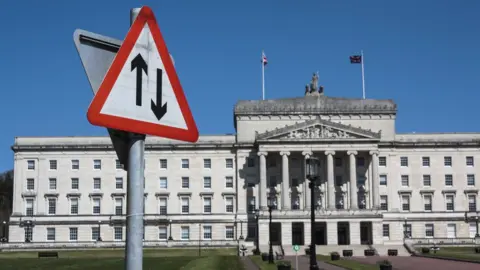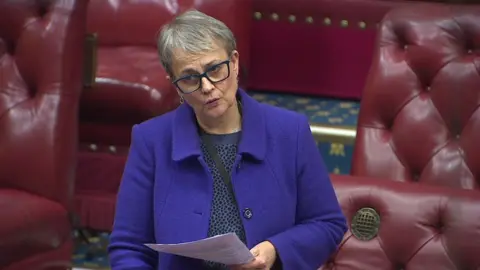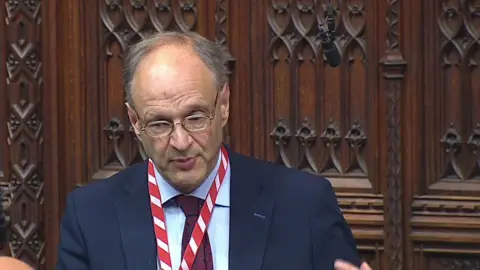Stormont: MLA pay cut bill passed in House of Lords
 Getty Images
Getty ImagesLegislation to give the Northern Ireland secretary powers to cut assembly members' salaries has passed all its hurdles at Westminster.
It was approved in the House of Lords on Monday night.
The Executive Formation Bill was fast-tracked after the government introduced it last month.
But it remains unclear when Chris Heaton-Harris could choose to impose a pay cut.
The legislation will also have to receive Royal Assent before it comes into force, although this is merely a formality.
Last week, during a debate in the House of Commons on the bill, Mr Heaton-Harris said he would "act rapidly" to cut MLA wages.
He previously indicated he would move to impose a reduction of 27.5%, or just over £14,000, reducing MLAs' incomes from £51,500 to £37,337.
The bill will also extend the time period for parties to return to power-sharing government at Stormont.
If the DUP refuses to end its boycott of the Stormont institutions by this Thursday, the bill will give Mr Heaton-Harris the option to either call an election, which would be for some point between mid-January and the beginning of March, or extend the deadline by six weeks to 19 January.
If nothing changes by that extended deadline, an election could take place by 13 April.
The legislation will also clarify the "limited decision-making" powers that civil servants now have in the absence of ministers.
'Sticking plaster on running sore'
Extra provisions are also being made to allow a regional rate to be set, should an executive not be in place, as well as powers for the approval of some public appointments.
 House of lords
House of lordsDuring Monday's debate in the Lords, Baroness Ritchie, a former SDLP minister, said the bill "represents a further manifestation of political failure".
"It is the secretary of state putting a sticking plaster on a running sore of ongoing political paralysis, and kicking the proverbial can down the road," she added.
Former DUP Education Minister, Lord Weir gave his first speech since taking up his seat in the Lords.
He described the bill as a "reluctant necessity brought about by the failure to deal with problems caused by the protocol".
"Holding an election at the minute would act as a distraction from resolving issues but would also not tell us anything different," he said.
 House of lords
House of lordsFormer Secretary of State, Lord Murphy said the government needed to "think carefully" about the January deadline it was imposing.
"Unless it's a clever ruse, which I don't think it is, it needs to be re-thought," he added.
Northern Ireland Minister Lord Caine described the bill as "highly unsatisfactory" but that it remained a "necessary stopgap" to allow decisions on public services to be taken.
He said the bill was never intended to set an "indefinite deadline", but rather a short window to allow space for negotiations on the protocol between the UK and EU.
